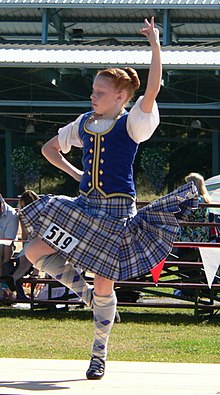Scottish highland dance
Highland dancing is a traditional dance which comes from Scotland. Highland dancers need a lot of stamina and strength as they need a good sense of aesthetics. They execute the traditional dance in solo to the sound of the great highland bagpipe. The highland dances are very precise and need a lot of coordination.[1] There are many competitions for highland dancing organized around the world, mainly in Scotland, United States, Canada and Australia.

Competition judging
changeDancers are judged on three elements:
- Timing: First, dancers have to follow the rhythm of the music.
- Technique: Secondly, they have to execute the step correctly; the position of the feet, arms and head have to be done precisely.
- Posture: Finally, they are evaluating on their interpretation of the dance. They have to get a good appearance and have to smile like the dance is very easy and natural.[2]
If a dancer does all these three elements perfectly, they have a great advantage over the others.
Highland dances
changeHere are the main traditional highland dances:
- The Highland fling is traditionally a four or six steps dance performed after a victory in a battle.[2]
- The sword dance is performed around a crossed sword on the bagpipes song Ghillie Calum. It starts with two or more slow steps and ends with one or two quick steps. The aim of the dance is not to displace the sword.[1]
- The Sean Triubhas is a dance that represents a person who lost his pants. In fact, at one time, Scottish could not wear the kilt and was only allowed to wear pants. In 1747, the British law abolished this old law and gave back to Scottish the right to wear their kilt. So in the first part, the dancers mimic a Scottish trying to put on his pants and in the last part, they mimic one who is getting back his right to wear the kilt and his customs.
- The Irish jig is a parody of Irish dancing and is performed with red, black or green hard shoes. An angry house wife, because her husband has taken some money to go to the pub, is waiting him at the halt.
Costumes
changeWomen wear a kilt, a kilt jacket (with or without sleeves), a blouse, ghilies and kilt socks. Men wear a kilt with a sporran, a white shirt with a thin tie, a dark jacket, green or black hose and ghilies shoes. These are only for certain dances (fling, sean triubhas, barracks johnnies, tulloch/half tulloch and highland laddie) There is seperate costumes for other dances, for the flora, scotch measure, lilt and a few others the outfit is called and aboyne. The hornpipe and jig have separate outfits too.
References
change- ↑ 1.0 1.1 "Introduction". Retrieved 1 January 2013.
- ↑ 2.0 2.1 "The History of Highland Dance" (PDF). Retrieved 1 January 2013.